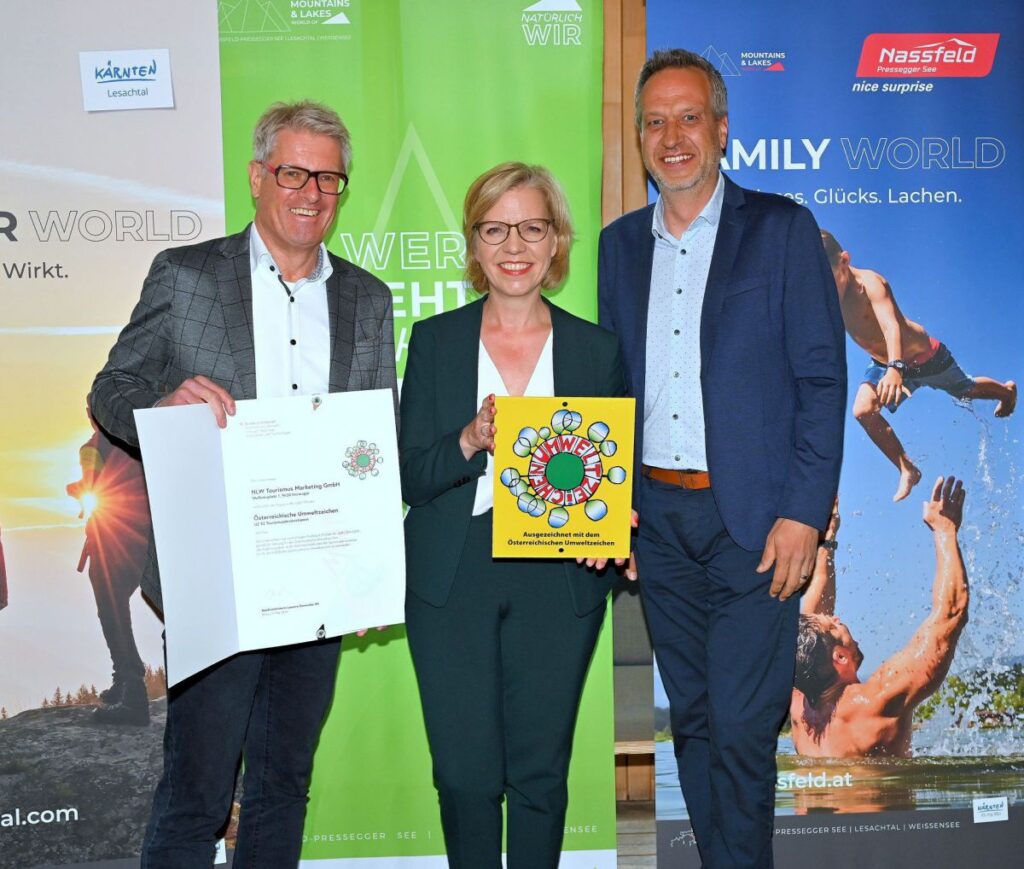by Stefan Nungesser, Carinthia University of Applied Sciences (CUAS)
How certifications can support sustainable tourism and community engagement, the example of Carinthia Region in Austria
Sustainable tourism development as a starting point
The World Tourism Organisation (UNWTO) sums up what characterises sustainable tourism development with the following quote: “Tourism that takes full account of its current and future economic, social and environmental impacts, addressing the needs of visitors, the industry, the environment and host communities.”
It is therefore not only about achieving an appropriate balance between the ecological, economic and socio-cultural aspects, but also about taking into account the needs of today’s guests and the host regions. At the same time, all resources should be utilised in such a way that economic and social needs can be met without neglecting the preservation of cultural integrity, essential ecological processes, biodiversity and the systems that guarantee life.
This fundamental basis also applies to our project the WeNaTour project, The European Alliance for Innovation and Sustainability Education in Welfare, Nature and Tourism. In addition to the importance of nature for people’s health and well-being, this EU co-financed project also focuses on the use of natural resources in tourism destinations for company welfare programs. However, a key component of the project is the transfer of skills relating to sustainable tourism to students and tourism practitioners. This also includes knowledge of audit and certification processes in accordance with international standards, which should enable long-term sustainable tourism development.
Importance of certifications in tourism
Certifications are standardized systems that support companies in the introduction and implementation of sustainability practices in the environmental, social and economic areas. They promote voluntary commitments to sustainability by setting out specific processes and targets that must be met to achieve certification and can be seen as an indicator of sustainability achievement (2).
To support tourism providers and destinations in this development, certification of sustainability efforts is often described as helpful in demonstrating credible implementation and communication. The majority of existing certification systems focus specifically on environmentally friendly measures, but many extend the spectrum to all dimensions of sustainability.
According to a representative survey of the German population on the topic of “sustainability and travel” conducted by the Bavarian Centre for Tourism in 2022, around 40% of respondents stated that they pay attention to sustainability seals or certificates when travelling to and from a destination, accommodation, leisure activities and local consumption (source). In booking.com’s Sustainable Travel Report 2023, 43% of today’s travellers would be willing to pay more for travel offers with sustainable certification (source). This emphasizes the growing importance that certifications are now assuming in travel decisions.

The Austrian Ecolabel is an internationally recognised environmental seal of quality and is awarded to particularly environmentally-friendly products and services. Official website
Innovation and development through sustainability certifications
All tourism service providers and destinations should therefore look into certifications, as they not only promote credibility to the outside world, but also sustainable development within the region. Österreich Werbung (Austrian’s National Tourist Office) has summarised the main advantages of sustainability certificates as follows:
- They create credibility and transparency by enabling an objective assessment of a destination’s sustainability performance by independent organisations. This promotes trust among travellers and interest groups.
- Certifications help travellers to identify sustainable destinations and accommodation and signal a commitment to environmental protection, social responsibility and economic sustainability.
- The prospect of certification motivates destinations to adopt and continuously improve sustainable measures based on recognised international standards.
- They enable benchmarking and comparison with other certified destinations, promote knowledge sharing and best practices.
- Certification often requires the cooperation of various stakeholders, which strengthens comprehensive involvement in strategic sustainability development.
- Finally, they serve as an effective marketing tool that increases the visibility and competitiveness of the destination in an environmentally conscious market environment (source).
In addition, it is emphasised that they can also have a positive impact on the employer branding of destinations and tourism providers and thus further drive change there. Strengthening the innovative mindset is particularly important and should be promoted by ensuring that locals and guests are given equal consideration in these processes. This equal approach has not always been observed in the tourism development of many destinations in the past and once again illustrates the importance of certification processes in destinations.
Carry out certification processes for destinations
The standards of the Global Sustainable Tourism Council (GSTC) are the main authority for certification processes in destinations. They are comprehensive and include several steps.
Destinations start with a self-assessment to evaluate their current sustainability performance. They should collect all relevant data and documentation that demonstrates their sustainable practices. They then select a GSTC-accredited certifier to carry out the assessment process. The list of accredited certifiers is available on the GSTC website. The destination submits a formal application to the selected certifier. A contract is signed that defines the scope, cost and timeframe of the certification process. The certifier reviews the documents and evidence submitted by the destination. This includes evidence of sustainable practices and compliance with the GSTC criteria. A team of auditors visits the destination to check on site whether the documented practices are actually being implemented. They conduct interviews with key stakeholders, including authorities, businesses and local communities. The certifier prepares a detailed assessment report that identifies the destination’s strengths and weaknesses in terms of sustainability and, based on this report, it is decided whether the destination will be awarded GSTC certification. If necessary, the destination creates an action plan to address identified deficiencies and improve its sustainability performance. A sustainability report documenting progress is produced regularly. If the assessment is successful, the destination receives GSTC certification. The certification is usually valid for a certain period of time and requires regular reviews and updates to ensure compliance with the standards.
In Austria, the criteria to be met by the certificates should be recognised by GSTC or be understood as equivalent. This is fulfilled by the Austrian Ecolabel for Destinations (Österreichisches Umweltzeichen für Destinationen), which also meets the criteria of the European Tourism Indicators (ETIS) and Green Destinations as an internationally recognised certificate.
An associated partner in the WeNaTour project, the Nassfeld-Lesachtal-Weißensee Tourism Region (NLW), was the first Carinthian tourism region to receive the Austrian Ecolabel for Destinations in May 2024, which impressively rewards its pioneering position in sustainable tourism and the many years of efforts to achieve this.

Awarding of the Austrian Ecolabel for Destinations to Awarding of the Austrian Ecolabel for Destinations to the Managing Directors of NLW-Tourismus Marketing by Federal Minister Leonore Gewessler. © Hans Jost Info here
Interested in certification and the Austrian experience? Have a look at these two videos…
Slow food travel – travelling to the roots of good taste
Christopher Gruber, Nassfeld Lesachtal Weißensee
Alpine pastures – between stereorype and reality
Michael Jungmeier, Unesco Chair on sustainable management for conservation Areas Carinthia University of Applied Sciences
Stay updated on WeNaTour’s news and opportunities




